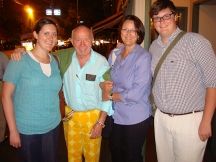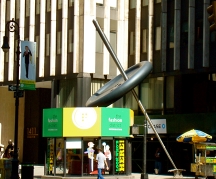
NEW YORK – People say, “Thank you!”
Elena Dementieva doesn’t know them. They are strangers, but they know her: Olympic gold medalist in tennis. She encountered them during the one day she had at home, Moscow, on the way to Flushing Meadow from Beijing.
“You know, when you win a tournament, or a big match, people will say, congratulations, or well done,” says the tall, charming Russian blonde who has bashed her way into the U.S. Open semifinals for a third time. “But the Olympics is different. They are thanking you for doing something for our country. It feels very nice.
“It was the same when I won the silver medal in Sydney in 2000. To me, even if I won here, Wimbledon or the others [majors], the Olympics would stand higher because everybody knows the Olympics. Tennis fans know the tournaments, but everybody knows the Olympics,” she says, radiating a dynamite smile. Compatriot Yevgeny Kafelnikov felt the same way when he won gold in Sydney, even though he possessed Australian and French titles.
What happened to her in Athens, 2004?
“Oh,” she laughs. “Oh, I had my heart so set on the gold. I tried too hard – and lost in the first round in singles and doubles.”
Her working day is over, she’s lounging in a tangerine track suit, and laughter is frequent. No grimness of a Russian tragedy that she sometimes displays on court. Up at 6 AM. Arrival from Manhattan at Billie Jean King Center at 8. Practice. Onto the blue floor of Ashe Stadium at 11, alongside the Swiss opposition, lefty Patty Schnyder, the mistress of spin.

They must have felt adrift in the middle of a sea, surrounded by great expanses of empty blue seats, maybe 20,000 in the 23,733 seat canyon. Too early. Novak Djokovic and Tommy Robredo would fill the joint for their five-set screamer later, as did Roger Federer, finally, unimpressively finding his way through a Russian fog in the handsome person of Igor Andreev.
But the ladies had to play each other for the 17th time, keeping each other company as the wind followed them around the sun-splashed arena. Schnyder won the first game, but got caught up in a 10 minute, six deuce third game, lost serve, and Elena was off to the semis, 6-2, 6-3, and a date with Jelly Jankovic.
Beating Schnyder for the 10th time, Dementieva says, “Patty gives you a different spin on every shot. She’s tricky.” But Elena’s power and long-legged maneuverability, a sharply-angled double-barrelled backhand got the job done.
“And patience. This was the hardest for me to learn. Patience. Very important.”
She started the long learning process to this, her highest ranking, No. 5, about 20 years ago. “I was 7. My mother put a racket in my hand. Wood then. I thought I was pretty young, but that would be old today, wouldn’t it,” she laughs. “I first traveled outside of Russia when I was 13. Thrilling. I went to Paris, and won the tournament, 14 and under. Guess who I beat?” Her stunning blue eyes are merry, the long blonde tresses shaking. “Justine Henin!”
It is Henin’s abdication from the tennis pinnacle that has created this game of roulette in the women’s precinct, a muddle in which any of four contenders for No. 1 can roll the ball into that slot by seizing the championship: Dementieva, Jankovic, Serena Williams, Dinara Safina.
“It’s great,” Dementieva says. “I’m glad to be part of it. She’s been part of the upper class, the top ten, since finishing No. 8 five years ago. For years she dreamed of getting there, since she and her childhood pal, Anastasia Myskina, played each other over and over, betting pizzas. “I can remember every day.”
Of course it was for thousands of pizzas on the biggest day, the French Open final of 2004. Myskina won, since departing, injured, now immersed in a TV career. Russians have been in her way: Svetlana Kuznetsova defeated Elena for the U.S. Open, title, also 2004.
She hasn’t lost a set this year. Four more and she’s the champ. “I have to play still better to do that, but I’m comfortable, confident.”

The former queen of the double fault now makes her serve behave. Memorable was her shriek, “I hate my serve!” during that French final. Every serve was an adventure. Her toss would go up somewhere, and nobody knew where the ball would land. She donated 10 points to friend Myskina on double faults, setting a tournament record for futility with 67.
After the final, reporter Charlie Bricker summarized, “Elena’s beautiful. She’s rich and travels the world. Who needs a serve?”
She laughed when I related the punch line. “The serve isn’t a worry any more.”
This semifinalist doesn’t have a worry in the world. After all, she has the gratitude of the Russian people.
Leave a Reply